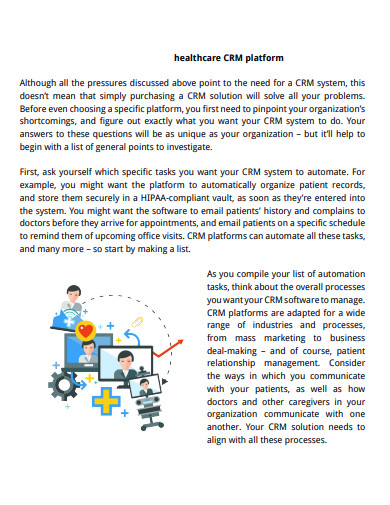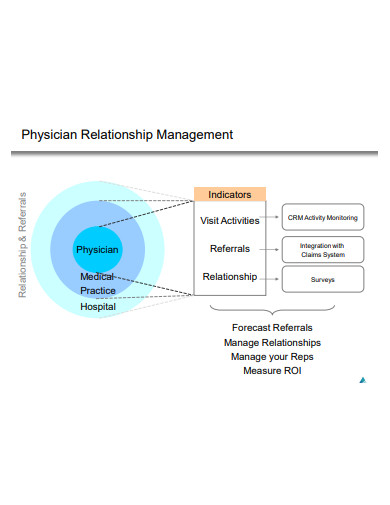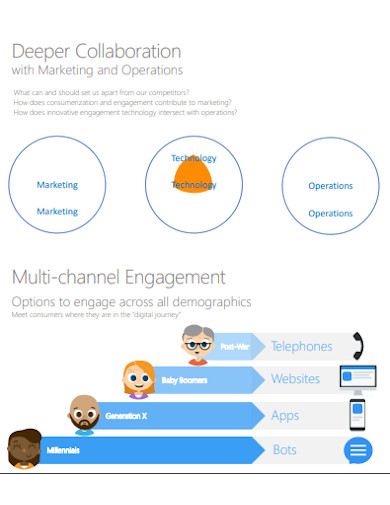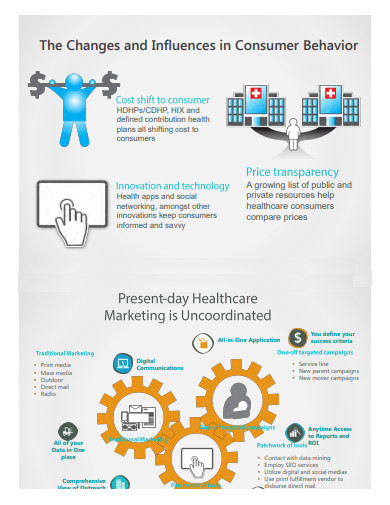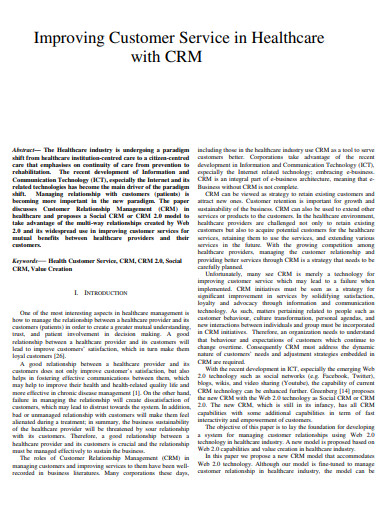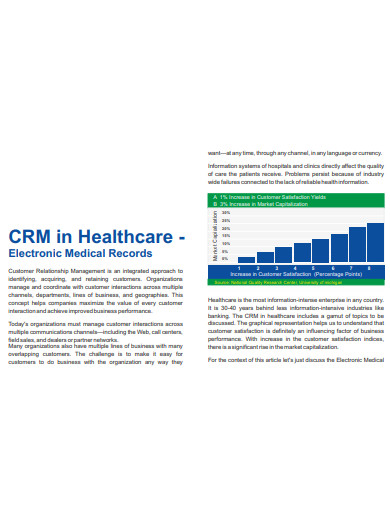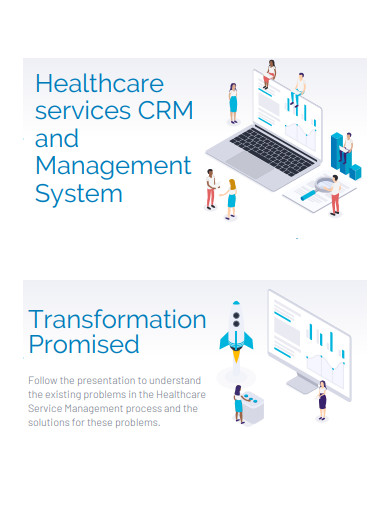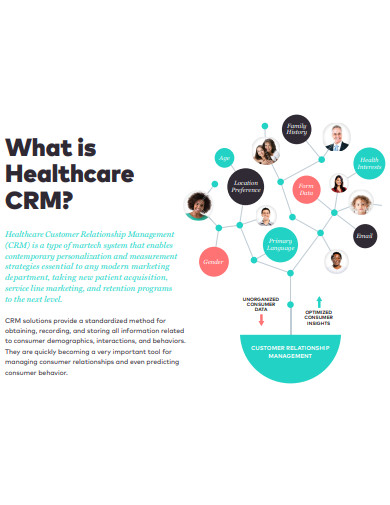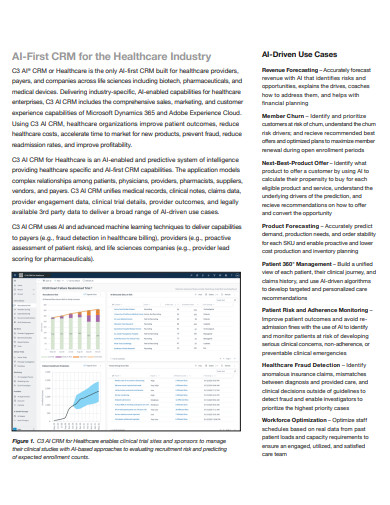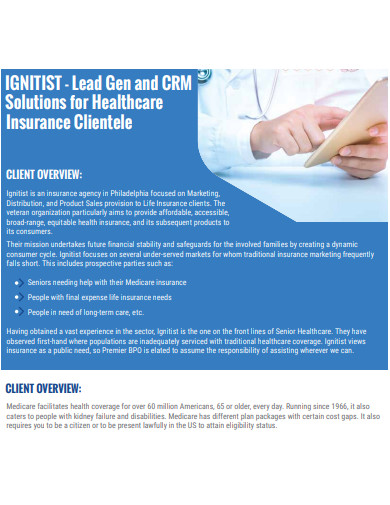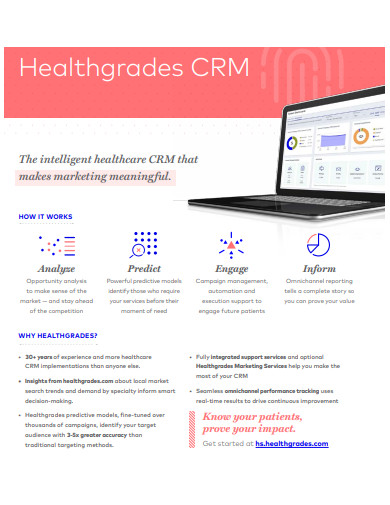The healthcare industry is a dynamic, thriving sector where technological advances and innovation coexist to benefit humans. Furthermore, governments all over the world make it a priority to ensure that healthcare hits the grassroots level. Variations in the environment, the emergence of various organisms, and climatic changes have resulted in a substantial shift in people’s lifestyle. As a result, humans’ susceptibility to many environmental influences and diseases has changed. In its daily operations, the healthcare business faces a number of problems. When there is so much to administer, it is a time-consuming chore to finish them manually.
10+ Healthcare CRM Samples
A healthcare CRM is a customer engagement system that is tailored to the needs of the medical business. Healthcare CRMs combine many data sources (consumer and patient demographics, psychographics, societal, psychological, clinical, monetary, website, contact center, provider credentialing, and so on) to provide a holistic view of patient activities and routines. A healthcare CRM system’s objective is to connect, acquire, and keep patients.
1. Healthcare CRM
2. Sample Healthcare CRM
3. Simple Healthcare CRM
4. Healthcare Website CRM
5. Basic Healthcare CRM
6. Formal Healthcare CRM
7. Healthcare Services CRM
8. Healthcare Hospital CRM
9. Healthcare Industry CRM
10. Professional Healthcare CRM
11. Healthcare CRM Example
All About Healthcare CRM
A medical CRM is a system that assists healthcare management in acquiring, retaining, and engaging patients, as well as providing individualized services. This medical CRM is applicable not just to the hotel business, but also to hospital suppliers, financials, and pharmaceutical sectors. The finest CRM for healthcare blends clinical, monetary, and social information from customers into a unified system.
The progress of medicine has also resulted in digital healthcare, where patients’ information can be retrieved quickly. However, while digital healthcare is a significant advancement, it has also introduced a number of new obstacles. This is important in service information accessibility and privacy concerns. It has sparked a global discussion, with governments enacting a slew of rules and regulations to safeguard patients’ health records.
Furthermore, as more competitors enter the market, hospitals are becoming more competitive, with each attempting to outperform the other in terms of providing personalized treatment. As a result, hospitals take every possible precaution to ensure that more people visit their facilities. They must have reputable doctors, specialists, specialized technology, and other resources to do this. All of this, when integrated with a powerful CRM, may work miracles.
Healthcare Customer Relationship Management may handle an entire patient registry that is confidentially kept and cannot be viewed by third parties. The CRM Medical software can simply send the necessary information to patients by text, phone conversations, or email from anywhere at any time. Furthermore, hospitals can utilize this data to ensure patients informed about individualized care as a component of marketing tool.
FAQs
How can I use a healthcare CRM to promote patient engagement and loyalty?
A healthcare CRM provides a comprehensive picture of each healthcare consumer and patient. Healthcare organizations can hyper-personalize exposure and interaction by sending a variety of consumer-centric mails based on communication preferences, such as holistic health advice, appointment reminders, follow-up memos, and post-discharge communications, using these 360-degree audience profiles.
What should I consider before implementing a healthcare CRM?
Before deciding on a provider, it’s critical to establish your objectives. What are your primary application scenarios? What specific features are required? What motivates the acquisition of a healthcare CRM? Another thing to think about is your data sources. In other words, where will the healthcare CRM get its data from? Defining your data sources early helps you to place responsibility for transferring data to the CRM and choose a CRM that can interface with numerous technologies and provide the necessary data governance process.
How can a healthcare CRM demonstrate marketing ROI?
Because measuring return on investment (ROI) is difficult, you cannot rely on manual math; instead, you need a healthcare CRM that helps you to design, implement, and assess marketing campaigns. A healthcare CRM monitors marketing progress throughout the campaign’s lifecycle, providing real-time performance data. In addition, healthcare CRMs generate thorough reports that attribute income to specific campaigns and techniques. In this method, healthcare marketers may see which campaigns (and specific components of those initiatives) are acquiring patients and driving lucrative growth for the health system.
To meet the increased demands and needs of patients and provide the necessary fulfillment, your healthcare business must use new software solutions, in this example, a customer relationship management (CRM) system. This system enables healthcare firms all around the world to establish and sustain positive customer connections by turning every client interaction into an opportunity. Furthermore, CRM for healthcare enables the quality healthcare industry to obtain and use critical consumer data more efficiently.
Related Posts
Student Research Proposal
Diet Plan
Housekeeping Resume
Marriage Proposal Letter
Nursing Resume
Fund Transfer Letter
Purchase Order Cancellation Letter
Certificate of Service
Employee Leave Form
Visitors Log
Requisition Form
Student Feedback Form
Payment Receipt Format
Formal Interview Letter
Reflective Writing

